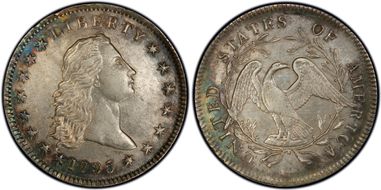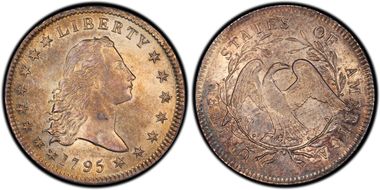1795 $1 Flowing Hair, BB-14 VF25 认证号42604517, PCGS号39981
专家评论
Q. David Bowers
The following narrative, with minor editing, is from my "Silver Dollars & Trade Dollars of the United States: A Complete Encyclopedia" (Wolfeboro, NH: Bowers and Merena Galleries, Inc., 1993). Note: the Notable Specimens list should be used with caution - it has been updated in my 2013 edition of "The Encyclopedia of United States Silver Dollars 1794-1804""Hidden Star Obverse."
Obv: Portrait I (Head of '94)
Rev: Eagle I, Wreath I (2 leaves)
Exists with silver plug at center
Exists overstruck on a 1794 dollar (B-4. H-4.)
OBVERSE 2: Star 15 is "hidden" entirely under the bust, where Miss Liberty cannot "see" even a part of it; the only 1795 obverse with this characteristic. Flowing hair in six curls; lowest curl ends faintly above two points of first star, and close to one point. Close date, figures 9 and 5 closest, and the distance between the 1 and 7 about the same as between the first star and figure 1. The 9 and 5 are lightly repunched. Two center dots; the larger is higher, slightly farther to the right, and closest below ear. Star closer to date than in any other variety, about 1.5 mm.
Obverse die used to strike 1795 BB-14 only.
REVERSE C: See description under BB.13. Reverse die used to strike 1795 BB-13 and BB-14.
DIE STATES:
Die State I: Perfect dies. Early impressions may have a small lump under the chin and/or die flaws near the rim opposite stars 10 and II.
COLLECTING NOTES: 1795 BB-14 is one of the more readily available issues of the year. An estimated 350 to 550 exist in all grades combined. The specialist will have no trouble acquiring a specimen in just about any grade up to VF. At the EF level, BB- 14 becomes somewhat elusive, but a specimen in this grade can usually be acquired easily with less than a year's search. AU coins are rare, and Mint State examples are very rare.
The rims on this issue are higher than most other 1795 dollars, giving them a somewhat more "modern" appearance than the typical variety of this year. Planchet adjustment marks are not often seen on BB-14. A few pieces I have seen have had black carbon streaks, the result of improper alloy mixing. Probably a batch of 1795 BB-14 dollars was made from an impure alloy melt.
The only known 1795 dollar overstruck on a previously coined 1794 is of the BB-14 variety and is described at length below. This suggests that 1795 BB-14 was probably included among the first dollars minted in 1795. As such it helps verify the varieties listed in Striking Period 1 were the first struck.
NOTABLE SPECIMENS:
Parmelee Specimen. MS-63 . Parmelee: 702 (U.S. Coin Co., June 1890), now untraced, appears from the plate to have been a gem. October Sale Specimen. MS-62 (NGC) . Superior, October Sale, 1990: 3713. "Premium Quality. Glorious lustre, with a whisper of antique toning. Surfaces are pristine."
Carter Specimen. MS-61 (PCGS). Amon Carter,Jr. Collection Stack's, 1984: 209, "Brilliant Uncirculated, full frosty mint lustre, planchet adjustment marks on the head-mostly in area of temple, slight weakness on the lower portion of the eagle, gray russet and iridescent toning." Dillard Collection, Heritage, 1990: 969, "AU-58." Now MS-61 (PCGS)
Jenks Specimen. MS-60+ . John Story Jenks Collection, Chapman, 1921. Superior, Shore Collection, 1988: 2176. "A sharp strike on a large planchet with nearly full hair detail on Liberty and partial detail on eagle's breast. Surfaces are fully lustrous with blue and green-gold toning. Some trivial adjustment marks on the obverse rim from 12:00 to 1:00."
Mills Specimen. MS-60. The Mills Collection coin (Chapman brothers, April 1904) was catalogued as Uncirculated.
San Diego Sale Specimen. AU-53. Mid-American, San Diego Sale, 1989: 713, centers are rich gray, some iridescence at edges, considerable luster on surfaces, centers not fully brought up, slight amount of even, gentle wear.
Garrett Specimen. AU-50. Bowers and Ruddy, 1980: 678. "AU-50, exquisite strike, full borders, usual adjustment marks hardly noticeable, details outstanding, most of original mint frost evident except in certain areas of field and highest parts of design where frost has disappeared, two very small edge marks on obverse rim between sixth and seventh stars, lightly toned, light gray with golden hues around stars and letters of LIBERTY."
"Omnium Gatherum" Specimen. AU-50. "Omnium Gatherum" Sale, Lester Merkin, 1968: 359, "Borderline Uncirculated. Evidently never in circulation, as fields are full of frost; dull on raised surfaces and with the faintest hint of rubbing on one or two curls only. Faint reverse adjustment marks. Mediocre strike, light bagmarks, faint signs of old cleaning, small stain in reverse wreath."
Terrell Specimen. AU-50. Bowers and Ruddy, Terrell Collection, 1973: "Lustrous, well-struck, free of weaknesses."
UNIQUE OVERSTRIKE on a 1794 dollar. Offered by Kagin's Numismatic Auctions, as Lot 3221 in the 1987 ANA Convention Sale, was a coin described as follows:
1795 Unique! Struck over a 1794 dollar. Bolender 4. The only known specimen, and the first time this important coin has been offered at public auction. Discovered by Walter Breen, who first described it to the numismatic community in The Metropolitan Numismatic Journal, issue No.1, May-June 1961."1 The 1961 description follows:
"On the obverse of the 1795 can be plainly seen the eagle, a wreath, and parts of UNITED .... On the reverse of the 1795 are visible the profile and part of the back of Liberty’s head .... Proof that the undertype is in fact a 1794 is easy. No other dollar reverse of this design except the 1794 has positions of U and final A in AMERICA as shown here ........... On this, all details that are visible match the 1794 exactly ....... .
"[Breen went on to suggest that the Mint was embarrassed with the weakly struck 1794s, and overstrikes could have been made as] testimony to the Mint's propaganda needs at a time when its detractors were ready to seize on anything available as evidence of its incompetence to make acceptable coins for the young and growing nation."
Pedigree of the 1795/1794 coin: From unidentified West Coast dealer who sold it at the Numismatic Association of Southern California Convention in Los Angeles circa 1960. Walter H. Breen, March 1961. Empire Coin Company, Inc. (Q. David Bowers and James F. Ruddy). Walter H. Breen (again), Central States Numismatic Society Convention, April 1961. Art Kagin. 1987 ANA Convention sale by Kagin's, Lot 3221, bought in. Richter Collection. Julian Leidman, offered for $50,000 at the ANA Convention, August 1992, but sold to the following for a lesser sum. Bowers and Merena Galleries, 1992.
Ron Guth
One of the more unusual, and highly important, coins in the American series is a 1795 Silver Dollar (of the Bolender 4, Bowers-Borckardt 14 variety) struck over a 1794 Dollar. This unique coin shows the undertype of another Dollar on both the obverse and reverse, and sufficient points remain to make a positive attribution to a 1794 Dollar. This coin has been described variously as an error or a deliberate use of poorly struck 1794 Dollars as "blanks" for 1795 Dollars, but, since no other example has appeared since this one was discovered circa 1960, the latter scenario seem unlikely. The last appearance of this coin at auction was in 2004 when it sold in an NGC AU53 holder for $175,375.
PCGS #
39981
设计师
Robert Scot
边缘
Lettered: HUNDRED CENTS ONE DOLLAR OR UNIT
直径
40.00 毫米
重量
27.00 克
铸币数量
16029
金属成分
90% Silver, 10% Copper
更高评级数量
9
评级较低的钱币数量
5
地区
The United States of America
价格指南
PCGS 数量报告
拍卖 - PCGS 评级的
拍卖 - NGC 评级的






















